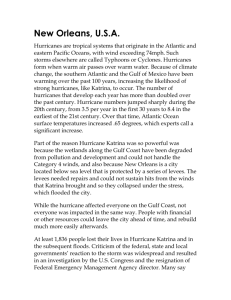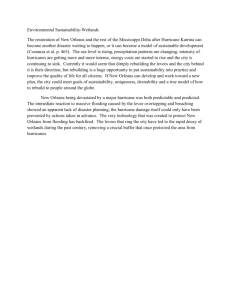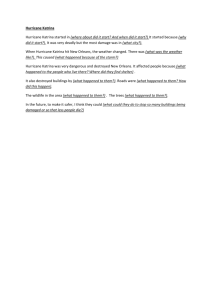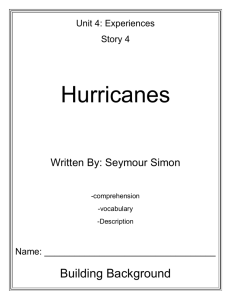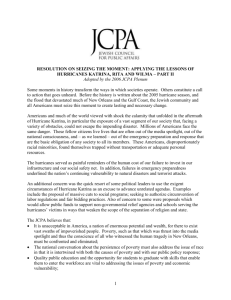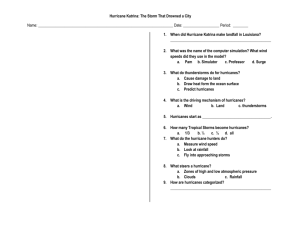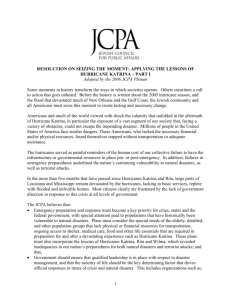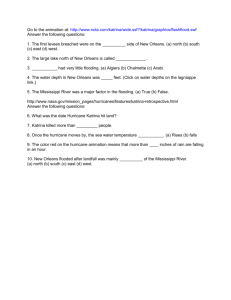America has had her fair share of hurricanes and the
advertisement
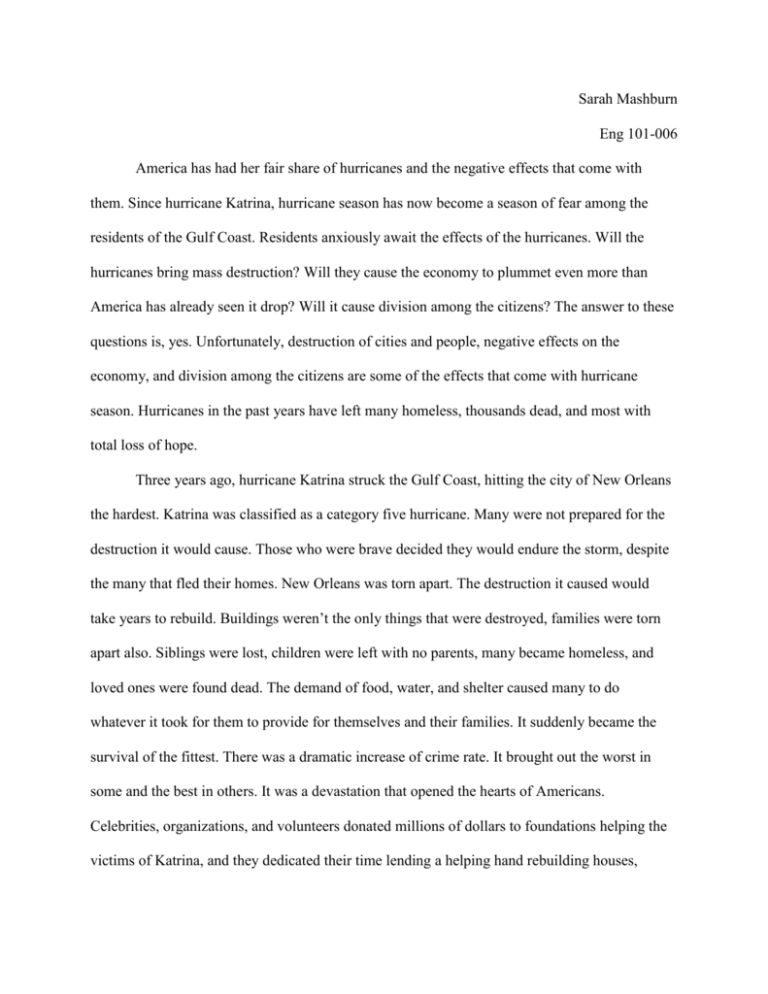
Sarah Mashburn Eng 101-006 America has had her fair share of hurricanes and the negative effects that come with them. Since hurricane Katrina, hurricane season has now become a season of fear among the residents of the Gulf Coast. Residents anxiously await the effects of the hurricanes. Will the hurricanes bring mass destruction? Will they cause the economy to plummet even more than America has already seen it drop? Will it cause division among the citizens? The answer to these questions is, yes. Unfortunately, destruction of cities and people, negative effects on the economy, and division among the citizens are some of the effects that come with hurricane season. Hurricanes in the past years have left many homeless, thousands dead, and most with total loss of hope. Three years ago, hurricane Katrina struck the Gulf Coast, hitting the city of New Orleans the hardest. Katrina was classified as a category five hurricane. Many were not prepared for the destruction it would cause. Those who were brave decided they would endure the storm, despite the many that fled their homes. New Orleans was torn apart. The destruction it caused would take years to rebuild. Buildings weren’t the only things that were destroyed, families were torn apart also. Siblings were lost, children were left with no parents, many became homeless, and loved ones were found dead. The demand of food, water, and shelter caused many to do whatever it took for them to provide for themselves and their families. It suddenly became the survival of the fittest. There was a dramatic increase of crime rate. It brought out the worst in some and the best in others. It was a devastation that opened the hearts of Americans. Celebrities, organizations, and volunteers donated millions of dollars to foundations helping the victims of Katrina, and they dedicated their time lending a helping hand rebuilding houses, offering their services at shelters, and handing out supplies. It created unity within the country while many worked together to improve the lives of the survivors. A most recent effect that we have experienced from a hurricane is from hurricane Ike. It moved through the Texan coast causing all of the oil rigs on the coast to shut down. A major necessity for most Americans became obsolete as many gas stations were forced to close because there was no gas available. Overnight gas prices sky rocketed making it almost a dollar fifty more, on average, than the day before. Because gas prices were so high before this happened, now it is even harder for businesses to compensate for profit losses because people are cutting back on unnecessary expenses. America’s bad economy has been hurt even worse because of the economic effect of the hurricane. Americans have become more conscientious of the amount of gas that is used and are forced to limit their driving. By the end of next week the price of gas is said to be almost six dollars a gallon in some areas. Those who can’t afford gas will miss work creating a snowball effect for the businesses of the employees. Even though Ike wasn’t as devastating as Katrina, the country is still experiencing the ripple effect by sky rocketing energy prices. Economic effects of hurricanes, especially from Katrina, also include homeless being forced to find housing at hotels across the country, business men are forced to let go of their successful estates, and families have to begin new lives. Unemployment rates shoot through the roof and finding a job is scarce. Finally, people use the devastating effects of a hurricane to point fingers and find fault in each other in a feeble attempt to justify the destruction. So, who’s to blame? That is a question that could be debated by many. The bitterness that developed from the people affected by hurricane Katrina caused them to cast blame on the government for not building stronger levies to withstand the hurricane. In response to the pressure from the people of New Orleans, the mayor of New Orleans blamed President Bush, claiming that if New Orleans was a more ethnically white populated city then the government would have made a better effort toward making sure that the levies were strong enough. These racist judgments angered the many Americans who were saying that no one was to blame for this natural disaster. Many feel that the mayor was to blame because he did not have proper evacuation plans in place in case the levies were to break. God also became one to blame. People said that He allowed the hurricane to punish the sinners of New Orleans. The once united country and the loyal citizens of New Orleans slowly became divided based on their views of the causes of the hurricane. A once lively tourist attractive city quickly changed to a desolate cold city. The after math was overwhelming as people thought about the rebuilding process. There are many negative effects of hurricanes. Cities are destroyed, the economy plummets, and people turn against each other. Hopefully, the worst effects of hurricanes have come and gone. In situations such as these it is impossible to find a solution to prevent hurricanes from ripping through the coast or hurting the economy. Hurricanes are an intense act of nature that can’t be controlled. Only time can mend the cities back together that were ruined and only time can heal the hearts of those who experienced the worst and lost everything. The mass destruction of hurricanes has cost the country billions of dollars to rebuild the areas affected by the hurricanes. Hurricanes are a powerful cause with harsh effects.
